|
|
|
Sort Order |
|
|
|
Items / Page
|
|
|
|
|
|
|
| Srl | Item |
| 1 |
ID:
078891
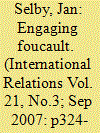

|
|
|
|
|
| Publication |
2007.
|
| Summary/Abstract |
This article provides a critical survey of the appropriation of the work of Michel Foucault within poststructuralist IR. Foucault has thus far been employed within poststructuralist IR in three ways: to support deconstructions of realist international theory; to analyse modern discourses and practices of international politics; and to develop novel accounts of the contemporary global liberal order. I argue that the first and the third of these usages are especially problematic. Utilised for the critique of realism, Foucault's main emphases have consistently been overlooked or misrepresented. By contrast, when `scaled up' to inform analyses of world order, Foucault's work has ended up supporting essentially liberal accounts of international politics. There are, I argue, clear limits to the use of Foucault in theorising international and world politics, and given this I conclude that if Foucault is to be used more effectively within IR, his work needs to be situated within a framework - I suggest a Marxist one - which is cognisant both of the structural dimensions of power, and of the specificity and irreducibility of the international
|
|
|
|
|
|
|
|
|
|
|
|
|
|
|
|
| 2 |
ID:
060634
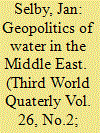

|
|
|
| 3 |
ID:
187372
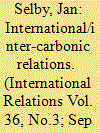

|
|
|
|
|
| Summary/Abstract |
If international relations can be theorised as ‘inter-textual’, then why not also – or indeed better – as ‘inter-carbonic’? For, not only is the modern history of carbon to a large degree international; in addition, many of the key historical junctures and defining features of modern international politics are grounded in carbon or, more precisely, in the various socio-ecological practices and processes through which carbon has been exploited and deposited, mobilised and represented, recycled and transformed. In what follows I seek to make this case, arguing that carbon and international relations have been mutually constitutive ever since the dawn of modernity in 1492, and that they will inevitably remain so well into the future, as the global economy’s dependence on fossil carbon continues unabated and the planet inexorably warms. Will climate change generate widespread conflict, or even civilisational collapse? How are contemporary power dynamics limiting responses to climate change? And how, conversely, might 21st-century world order be transformed by processes of decarbonisation? Building on research in political ecology, I argue that a dialectical sensitivity to ‘inter-carbonic relations’ is required to properly answer these questions. Scholars and students of International Relations (IR), I suggest, need to approach climate change by positioning the element C at the very centre of their analyses.
|
|
|
|
|
|
|
|
|
|
|
|
|
|
|
|
| 4 |
ID:
136219
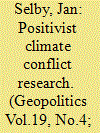

|
|
|
|
|
| Summary/Abstract |
In recent years a large body of work has emerged that uses a positivist epistemology and quantitative methods to assess the likely conflict impacts of global climate change. This article advances a critique of this positivist climate conflict research programme, identifying within it three serial shortcomings. It contends, first, that the correlations identified by this research are specious, since they always rest upon coding and causal assumptions which range from the arbitrary to the untenable. It argues, second, that even if the correlations identified within this research were significant and meaningful, they would still not constitute a sound basis for making predictions about the conflict impacts of climate change. And it submits, third, that this research programme reflects and reproduces an ensemble of Northern stereotypes, ideologies and policy agendas. A departure from positivist method is required, the article contends, if we are to get close to thinking through the wide-ranging political and conflict implications of the human transformation of the global climate.
|
|
|
|
|
|
|
|
|
|
|
|
|
|
|
|
| 5 |
ID:
136215
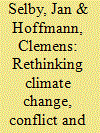

|
|
|
|
|
| Summary/Abstract |
This special issue of Geopolitics presents a series of critical interventions on the links between global anthropogenic climate change, conflict and security. In this introduction, we situate the special issue by providing an assessment of the state of debate on climate security, and then by summarising the eight articles that follow. We observe, to start with, that contemporary climate security discourse is dominated by a problematic ensemble of policy-led framings and assumptions. And we submit that the contributions to this issue help rethink this dominant discourse in two distinct ways, offering both a series of powerful critiques, plus new interpretations of climate-conflict linkages which extend beyond Malthusian orthodoxy.
|
|
|
|
|
|
|
|
|
|
|
|
|
|
|
|
| 6 |
ID:
164988
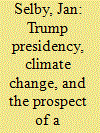

|
|
|
|
|
| Summary/Abstract |
This article reflects on the implications of the Trump presidency for global anthropogenic climate change and efforts to address it. Existing commentary, predicated on liberal institutionalist reasoning, has argued that neither Trump’s promised rollback of domestic climate-related funding and regulations, nor withdrawal from the Paris framework, will be as impactful as often feared. While broadly concurring, I nonetheless also in this article take a wider view, to argue that the Trump administration is likely to exacerbate several existing patterns and trends. I discuss four in particular: the general inadequacy of global greenhouse gas emissions reduction targets and implementation efforts; the inadequacy of contemporary climate financing; the embrace between populist conservatism and opposition to action on climate change; and not least, the current global oil and gas boom which, crucially, is being led by the US. I submit that these patterns and trends, and the Trump administration’s likely contributions to them, do not augur well for climate change mitigation, let alone for an orderly transition to a low-carbon global economy. Given current directions of travel, I suggest, this coming transition is likely to be deeply conflict-laden – probably violently so – and to have consequences that will reverberate right across mid-twentieth-century international order.
|
|
|
|
|
|
|
|
|
|
|
|
|
|
|
|
| 7 |
ID:
191448
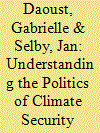

|
|
|
|
|
| Summary/Abstract |
Policy discourse on the conflict and security implications of climate change has repeatedly found it to be overstated, misleading, and out of line with the balance of scientific evidence. However, the reasons for this recurring science-policy divide have not yet been systematically investigated. To explore this issue, we examine the case of Lake Chad, which over the last decade has become a poster child for climate conflict. We seek to understand and explain how this climate security narrative has gained such traction. Drawing on interviews and documentary analysis we examine the key practices, interests and hierarchies underpinning the narrative’s rise and reproduction, and show that it is essentially a political construct, reflecting a combination of questionable epistemic manoeuvres and geopolitical, economic and climate mitigation agendas. Our findings suggest the need for change, and increased caution, in how the climate security community engages with scientific evidence.
|
|
|
|
|
|
|
|
|
|
|
|
|
|
|
|
| 8 |
ID:
049836
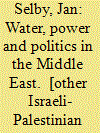

|
|
|
|
|
| Publication |
London, I.B. Tauris, 2003.
|
| Description |
xii, 275p.
|
| Standard Number |
1860649343
|
|
|
|
|
|
|
|
|
|
|
|
Copies: C:1/I:0,R:0,Q:0
Circulation
| Accession# | Call# | Current Location | Status | Policy | Location |
| 047350 | 333.9100956/SEL 047350 | Main | On Shelf | General | |
|
|
|
|
|
|
|
|
|